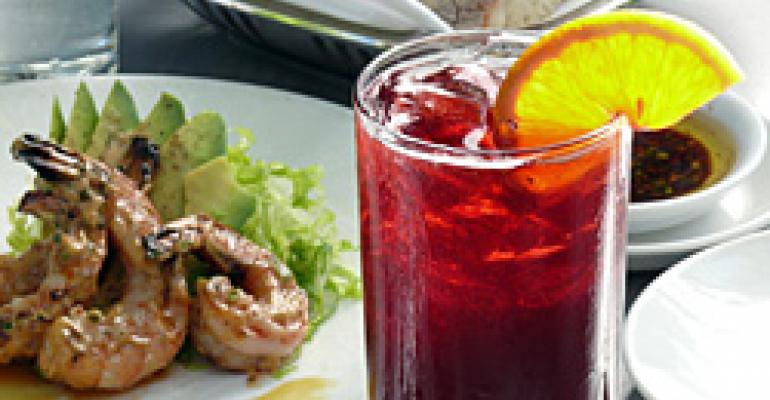A "do it yourself" trend is raging in the cocktail world, and it's all about flavor.
The proof is in the prevalence of house-made spirit infusions at the bar and the creative cocktails that they inspire.
Note the Madagascar vanilla bean house-infused Rain vodka starring in a drink called the Flying Fig at Uncommon Ground in Chicago, which also contains orange liqueur, honey liqueur, star anise, mission fig, ginger, cardamom, and medjool date. The drink list of Millennium Restaurant in San Francisco touts house infusions like ginger-lemongrass rum and grapefruit tequila. For its part, the New York Times cited "wildly creative infused spirits" in a restaurant review of Tailor in Manhattan, home of novelties like tobacco bourbon and pumpernickel raisin Scotch.
The practice of soaking fruits, herbs, spices and the like in liquors may have peaked several years ago, reported Portland, Ore.-based cocktail consultant Ryan Magarian in an email, but it is "still wildly popular" in many bars.
"Personally, I still use base spirit infusions quite a bit," said Magarian, who has a company called Liquid Relations. "They have the greatest flavor impact on a cocktail, because the base spirit makes up 40 to 50 percent of most of my drinks."
Abarman with a knack for inventing flavorful infusions and turning them into profitable signature cocktails is Bob Brunner, beverage director of Paragon Restaurant & Bar, also in Portland, part of the Mill Valley, Calif.-based Paragon Restaurant Group. His repertoire includes at least nine different house infusions with vodka, rum and tequila as the bases and a variety of fruits as the flavorings.
Brunner's infusions sell well year round, but they really hit their stride on the Paragon patio when the weather is warm. One of the favorites is the Five Star Cooler, a medley of blackberry, blueberry, pineapple, raspberry and strawberry house-infused vodkas plus house-made lemonade. "Last summer I sold so many, I'm bringing it back," said Brunner.
Each of the 28 selections on the Paragon signature cocktails list is priced at $8.50. Brunner said he hits his profit goals by weaving together lower- and higher-cost drinks.
The 20-percent liquor cost of his infusions, which he makes by hand in big batches with premium spirits typically purchased on discount, comes in handy for that. Thus, selling an infusion cooler balances the higher cost of a libation like the Uptown Manhattan, made with Eagle Rare 10 Year bourbon, Carpano Antico Formula vermouth, Regans' Orange Bitters and a fancy Luxardo Marasche cherry. It's a buy at $8.50.
Another Brunner specialty leverages local pride as well as flavor. The Crater Lake Cooler is a medley of marionberry house-infused Crater Lake vodka, Reed's Extra Ginger Brew and orange bitters. Both the marionberry, a type of blackberry, and the vodka hail from Oregon. The drink's intense berry flavor contrasts with the spiciness of the ginger brew and the dried-orange-peel nuance of the bitters. "It's a fun little patio cocktail for the summer," noted Brunner.
Brunner makes his popular raspberry infusion by mixing 10 pounds of fresh-frozen raspberries with two 1.75-liter bottles of Smirnoff vodka, one 1.75 liter bottle of Smirnoff Citrus Twist vodka and 6 ounces of superfine sugar in a large container and letting it soak uncovered at room temperature for 30 hours, stirring it several times. At that point, he strains out the berries. It yields seven 25-ounce plastic containers of infused spirits. That method, with slight variations, works for most of the other fruits he uses as well. He also makes an infusion of red jalapeño peppers, pineapples and strawberries in tequila that is the base of a lively drink called the Rosalita.
All the chopping, stirring, straining and bottling required to make house infusions begs the question: isn't it a lot easier to buy a bottle of flavored vodka? "Sure, but what's the fun in that?" countered Magarian. "You can get a much truer flavor by doing it all by yourself, and you can calibrate the flavor to your liking."
But there is a downside, Magarian warned: "Not every bar team has the discipline to consistently make good infusions." He likened infusing to slow cooking in the kitchen. Fruit flavors can be "overcooked," or ruined, by infusing too long. "Far too often, I see these jars of muck sitting on back bars, which I think is very amateurish, a total turn-off."
The disciplined Brunner said he is careful to strain his berry infusions at 30 hours for optimum quality, because if left to soak longer, bitterness creeps in.
"Making infusions is a lot of work," conceded Brunner. "But I'm excited about the way the cocktails turn out, and so are the customers."

